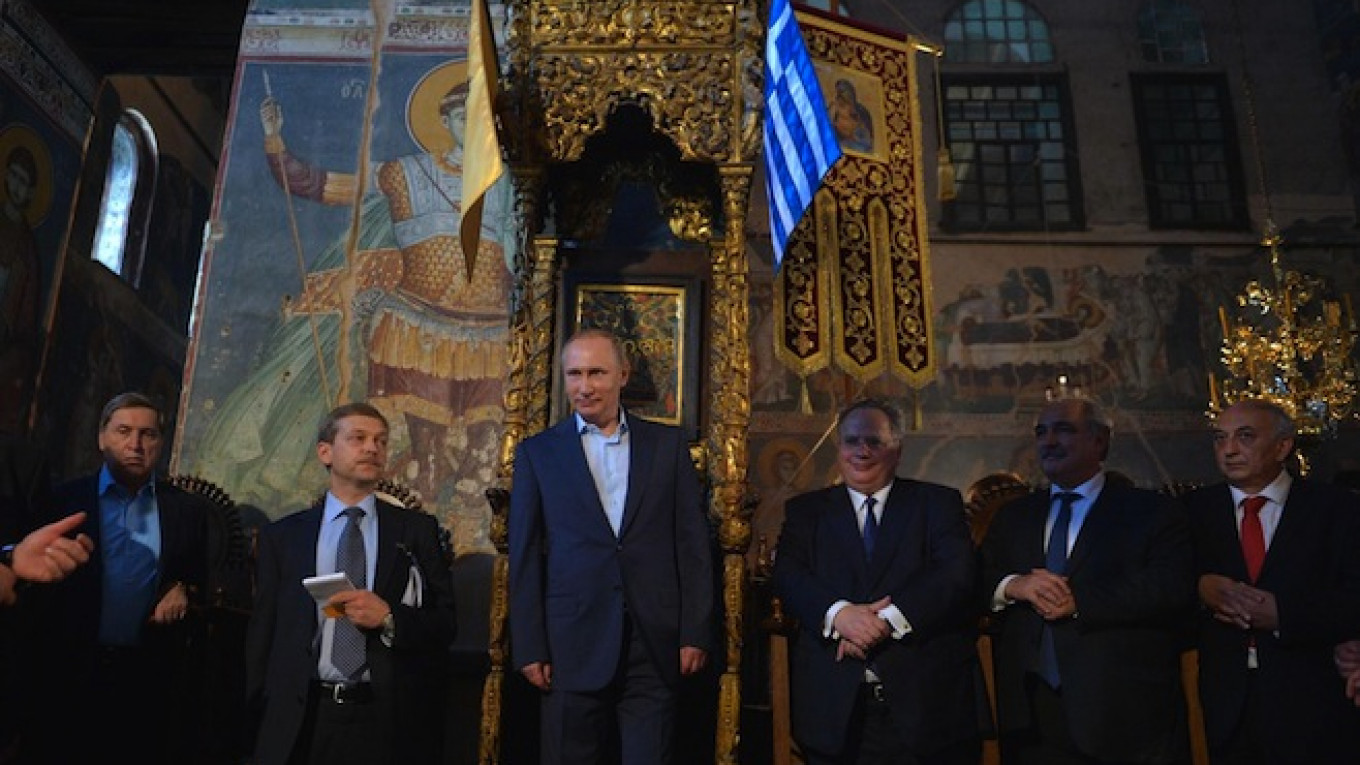The arrival of Russian President Vladimir Putin in Greece on May 27 to meet with the Greek leadership and visit Mount Athos was not at all accidental. Both countries share the same approach on the need for deeper energy partnership and large-scale investments in a global environment characterized by big political and economic uncertainty, the rise of religious extremism and warfare.
Greece and Russia have traditionally developed political and economic ties, not only driven by the obvious religious reference, but primarily as a result of mutual interests in the Balkan region and the Southeastern Mediterranean Basin.
The rise of Syriza to power reinstated this partnership. Syriza’s strategic priority was the development of a multilateral foreign policy that recognizes the merits of regional cooperation and seeks genuine cooperation with pivotal players in adjacent areas. Committed to preserve and multiply the appeal of the EU and Greece in a turbulent geographical region, the Syriza-led government strongly criticized the imposition of sanctions on Russia by the EU Council.
In this respect, Greek Prime Minister Alexis Tsipras in his meeting with Putin underlined the “strategic choice of the Greek government to strengthen bilateral relations, respecting Greece?€™s stance and position in the EU,” with Putin adding that ?€?we acknowledge that realism has to prevail in bilateral relations.?€?
What Russia Can Gain from Greece
High-level talks between the two delegations emphasized energy cooperation and the involvement of Russian companies in a number of privatizations. The creation of the new Greek Privatisation Fund has multiplied potential for investments in real estate and transport — it has to be noted that the inauguration of the Trans Adriatic Pipeline (TAP) facilitates Gazprom's plan to further develop the South Gas Corridor.
Transferring gas from Azerbaijan through Turkey toward Greece, Italy and then to Central Europe is only one option that Russia can further explore. The re-ignition of the trilateral partnership along with Greece and Bulgaria, and the benefits in terms of exploiting the prospective infrastructure scheme and capacity in Northern Greece, are certainly motivating factors for Gazporm to build on a multi-network of gas supply crossing the Balkan region and Western Europe.
Timing also matters as Greece is entering a new stage after 1.5 years of negotiations on its bailout program. The release of the next tranche, the agreement on a roadmap to finally address debt relief issues and the strong intention of the Greek government to emphasize growth and investment projects in the coming period is something Moscow evaluates positively. Greece has also broadened its energy policy coalitions with Israel and Cyprus in the Eastern Mediterranean, gaining significant leverage and recovering from a long period of non-involvement in regional affairs.
What Greece Can Gain from Russia
Greece is delicately re-shaping its positioning regionally, gaining confidence and foreseeing significant financial benefits, especially after introducing a new, investment-friendly growth bill into parliament. The first steps of cooperation with Russia were determined last year when Tsipras visited Moscow and a number of Greek officials and business representatives travelled to Moscow several times to explore reciprocal investment opportunities.
On the financial side, the Greek economy can take advantage of its open market for foreign non-EU investments and capitalize on the fact that the European Commission and the majority of member states have undertaken a critical stance against Russia?€™s financial involvement in their domestic economies.
For the Greek government, the lifting of sanctions and reinstatement of Russia?€™s position in the G8 is of paramount importance. A positive development on that front, with the European Commission assuming a more constructive approach, would also turn Greece into a top destination for Russian tourists.
On the geopolitical side, the deterioration of bilateral relations between Russia and Turkey and the fact that Greece is a low-risk area in terms of security challenges are considered as key incentives for deepening ties. In addition to that, Greece wants a strong ally and a global power on its side for the coming geopolitical shifts that will take place in the wider region, mainly regarding any negative shift in the refugee crisis and the ongoing turbulence in the Arab World.
Dimitris Papadimoulis is vice president of the European Parliament and head of the Syriza party delegation.


